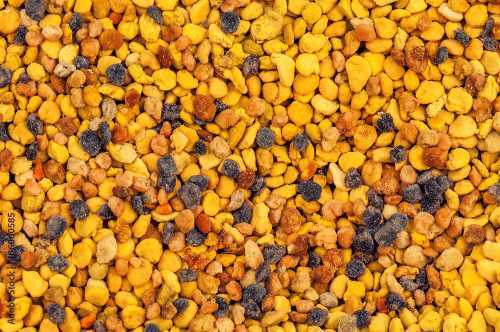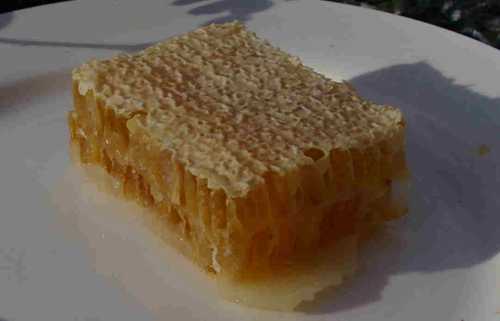What is Bee Pollen?
Bee pollen is pollen that has been collected from flowers by worker bees, packed into pellets.
The commercially available bee pollen - that which is sold as a superfood / health supplement, is collected by beekeepers from worker honey bees, using a pollen trap.
FAQS about Bee Pollen

Answers to commonly asked questions.
Is Bee Pollen Good For You?
There may be some small differences between different batches of bee pollen, because the nutritional content of pollen varies between species of plant.
Pollen contains a number of anti-oxidants, minerals, proteins and a number of other ingredients so that some believe bee pollen benefits humans as well as bees.
Having examined the evidence, I am personally skeptical. I would be wary of the marketing claims made, and:
- the instances where inconclusive evidence has been used, or
- where claims are made based on studies about a different food which happens to have a mineral in common with bee pollen. For example, I came across a claim that because kale has minerals which are good for the eye sight, bee pollen would be good for eye sight too, because it also contains those minerals. Well that's fine, but bee pollen as a is much more expensive than a food such as kale, which is a good source of various nutrients!
What do IBRA, (International Bee Research Association) say about Bee Pollen?:
“Two other bee products are pollen and royal jelly - the health giving
properties of these are less well documented in the scientific
literature”. - IBRA
To take a look at some of the claims made with regard to whether or not bee pollen is good for you, see these links:
- Bee pollen and nutrition - this page features a break down of nutritional tables. It compares these values with those found in far less expensive and widely available foods, such as an apple, or a portion of kale.
- Health benefits of bee pollen - considers some of the claims made, in relation to health, such as improved athletic performance, aging and eye sight.
- Bee pollen & weight loss - examines whether bee pollen is an aid to losing weight - taking into account that bee pollen is fairly high in calories in comparison with other beneficial foods. Upon anaylsis, some of the claims made are certainly questionable in my view, and the dieting industry has not exploited bee pollen as a dieting aid.
Products And Preparations
Supplements
can be purchased in a number of formats, in tablets, capsules and
granules, and sometimes combined, for example with royal jelly or
propolis.
However, according to the book ‘The Healing Powers of Pollen’,
the author, Patrice Percie Du Sert states that we now know that drying
pollen destroys most of the beneficial active ingredients in bee pollen.
If he is right, this may be of concern to those considering
purchasing dried pollen. Patrice Percie Du Sert advocates fresh bee
pollen that is removed from honey bee hives, and he has devised a way to
supply and sell bee pollen in such a format through a special process involving
freezing the pollen.
Is bee pollen a "super food"?
My analysis outlined on the links above, suggests that bee pollen contains a number of nutrients in tiny amounts that are essential to bees, with their tiny bee bodies and developing colonies.
These nutrients are also of benefit to humans, however, they are are also available in many commonly eaten and widely available foods (which happen to be less expensive). So if anyone would ask me "What is bee pollen and is it a Super Food?", I'd have to answer:
"it's a super food for bees, but as for humans, you may as well go and eat a portion of boiled kale, or even an apple - unless you want to consume lots of extra calories in your diet!".
Resources
The Healing Powers of Pollen’ by Patrice Percie Du Sert
What's the real difference?
